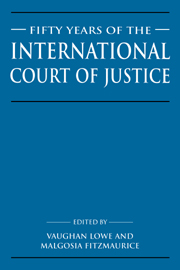Book contents
- Frontmatter
- Contents
- List of contributors
- Preface
- List of abbreviations
- Sir Robert Yewdall Jennings, by Vaughan Lowe
- List of publications of Sir Robert Jennings
- Table of cases
- Part I The International Court of Justice
- Part II The sources and evidences of international law
- Part III Substance of international law
- 10 The Court's role in relation to international organizations
- 11 Cases of the International Court of Justice relating to employment in international organizations
- 12 Jurisdiction and immunities
- 13 Adjudication as a mode of acquisition of territory?
- 14 Equitable maritime boundary delimitation
- 15 Environmental protection and the International Court of Justice
- 16 The contribution of the International Court of Justice to air law
- 17 The treatment of human rights and of aliens in the International Court of Justice
- 18 The International Court of Justice and the right of peoples to self-determination
- 19 The International Court of Justice and the peaceful settlement of disputes
- 20 The International Court of Justice and the use of force
- Part IV Procedural aspects of the work of the International Court of Justice
- Part V The International Court of Justice and the United Nations
- Index
11 - Cases of the International Court of Justice relating to employment in international organizations
Published online by Cambridge University Press: 02 November 2009
- Frontmatter
- Contents
- List of contributors
- Preface
- List of abbreviations
- Sir Robert Yewdall Jennings, by Vaughan Lowe
- List of publications of Sir Robert Jennings
- Table of cases
- Part I The International Court of Justice
- Part II The sources and evidences of international law
- Part III Substance of international law
- 10 The Court's role in relation to international organizations
- 11 Cases of the International Court of Justice relating to employment in international organizations
- 12 Jurisdiction and immunities
- 13 Adjudication as a mode of acquisition of territory?
- 14 Equitable maritime boundary delimitation
- 15 Environmental protection and the International Court of Justice
- 16 The contribution of the International Court of Justice to air law
- 17 The treatment of human rights and of aliens in the International Court of Justice
- 18 The International Court of Justice and the right of peoples to self-determination
- 19 The International Court of Justice and the peaceful settlement of disputes
- 20 The International Court of Justice and the use of force
- Part IV Procedural aspects of the work of the International Court of Justice
- Part V The International Court of Justice and the United Nations
- Index
Summary
There are five Advisory Opinions rendered by the International Court of Justice in cases pertaining to employment relations in international organizations. They were all Opinions requested either by the UN or UNESCO in connection with the operation of the UN Administrative Tribunal (UNAT) and the ILO Administrative Tribunal (ILOAT) respectively. The first Opinion given in 1954 was the result of a general reference by the UN General Assembly and concerned some basic questions regarding the UNAT. The other four were requests for review of decisions given in cases decided by the UNAT and the ILOAT in disputes between staff members and their organizations.
In the Effect of Awards case the General Assembly of the UN requested, under its general power to request Opinions, an Opinion on matters of law relating to the work of the General Assembly. The Opinion embodies rulings on some very important issues of law relating to employment relations and also discussed some general questions relating to that relationship.
In international organizations an executive or deliberative organ may initially rule on an employment dispute. There is generally no constitutional provision authorizing such a person or organ to settle the dispute. Nevertheless, such administrative settlement has been the prevailing procedure, in general at least for preliminary purposes, in all international organizations. Thus there can be no serious doubt that the executive or deliberative organs of the organization are entitled to decide these internal disputes themselves as, indeed, executive organs do in national states.
- Type
- Chapter
- Information
- Fifty Years of the International Court of JusticeEssays in Honour of Sir Robert Jennings, pp. 193 - 209Publisher: Cambridge University PressPrint publication year: 1996
- 1
- Cited by

